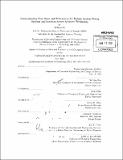Understanding user state and preferences for robust spoken dialog systems and location-aware assistive technology
Author(s)
Li, William (William Pui Lum)
DownloadFull printable version (8.983Mb)
Other Contributors
Massachusetts Institute of Technology. Technology and Policy Program.
Advisor
Nicholas Roy, Seth Teller and James R. Glass.
Terms of use
Metadata
Show full item recordAbstract
This research focuses on improving the performance of spoken dialog systems (SDS) in the domain of assistive technology for people with disabilities. Automatic speech recognition (ASR) has compelling potential applications as a means of enabling people with physical disabilities to enjoy greater levels of independence and participation. This thesis describes the development and evaluation of a spoken dialog system modeled as a partially observable Markov decision process (SDS-POMDP). The SDSPOMDP can understand commands related to making phone calls and providing information about weather, activities, and menus in a specialized-care residence setting. Labeled utterance data was used to train observation and utterance confidence models. With a user simulator, the SDS-POMDP reward function parameters were optimized, and the SDS-POMDP is shown to out-perform simpler threshold-based dialog strategies. These simulations were validated in experiments with human participants, with the SDS-POMDP resulting in more successful dialogs and faster dialog completion times, particularly for speakers with high word-error rates. This thesis also explores the social and ethical implications of deploying location based assistive technology in specialized-care settings. These technologies could have substantial potential benefit to residents and caregivers in such environments, but they may also raise issues related to user safety, independence, autonomy, or privacy. As one example, location-aware mobile devices are potentially useful to increase the safety of individuals in a specialized-care setting who may be at risk of unknowingly wandering, but they raise important questions about privacy and informed consent. This thesis provides a survey of U.S. legislation related to the participation of individuals who have questionable capacity to provide informed consent in research studies. Overall, it seeks to precisely describe and define the key issues that are arise as a result of new, unforeseen technologies that may have both benefits and costs to the elderly and people with disabilities.
Description
Thesis (S.M.)--Massachusetts Institute of Technology, Dept. of Electrical Engineering and Computer Science; and, (S.M. in Technology and Policy)--Massachusetts Institute of Technology, Engineering Systems Division, Technology and Policy Program, 2012. Cataloged from PDF version of thesis. Includes bibliographical references (p. 119-125).
Date issued
2012Department
Massachusetts Institute of Technology. Department of Electrical Engineering and Computer Science; Massachusetts Institute of Technology. Engineering Systems Division; Technology and Policy ProgramPublisher
Massachusetts Institute of Technology
Keywords
Electrical Engineering and Computer Science., Engineering Systems Division., Technology and Policy Program.